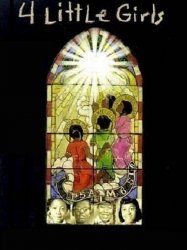The March is a american film of genre Documentary directed by James Blue released in USA on 31 december 1964 with Juliet Stevenson
The March (1964)

If you like this film, let us know!
Released in USA 31 december 1964
Length 33minutes
Directed by James Blue
OriginUSA
Genres Documentary
Themes Films about racism, Documentary films about racism, Documentary films about law, Documentary films about historical events, Documentaire sur une personnalité, Documentary films about politics, Political films
Rating66%










The March, also known as The March to Washington, is a 1964 documentary film by James Blue about the 1963 civil rights March on Washington. It was made for the Motion Picture Service unit of the United States Information Agency for use outside the United States – the 1948 Smith-Mundt Act prevented USIA films from being shown domestically without a special act of Congress. In 1990 Congress authorized these films to be shown in the U.S. twelve years after their initial release.
In 2008, the film was selected for preservation in the United States National Film Registry by the Library of Congress as being "culturally, historically, or aesthetically significant".
Synopsis
The March, également connue sous le nom de The March to Washington, est un film documentaire de 1964 de James Blue sur la marche des droits civiques de 1963 à Washington. Il a été réalisé pour l'unité Motion Picture Service de l'Agence d'information des États-Unis pour une utilisation en dehors des États-Unis - la loi Smith-Mundt de 1948 empêchait les films de l'USIA d'être diffusés à l'échelle nationale sans une loi spéciale du Congrès. En 1990, le Congrès a autorisé la distribution de ces films aux États-Unis douze ans après leur sortie initiale. En 2008, le film a été sélectionné pour être conservé dans le National Film Registry des États-Unis par la Bibliothèque du Congrès comme étant "culturellement, historiquement ou esthétiquement significatif".Actors
Comments
Leave comment :
Suggestions of similar film to The March
There are 20 films with the same actors, 3 films with the same director, 8969 with the same cinematographic genres, 10576 films with the same themes (including 50 films with the same 7 themes than The March), to have finally 70 suggestions of similar films.If you liked The March, you will probably like those similar films :

Malcolm X (1972)
, 1h31Directed by Arnold Perl
Origin USA
Genres Drama, Documentary
Themes Films about racism, Documentary films about racism, Documentary films about law, Documentary films about historical events, Documentaire sur une personnalité, Documentary films about politics, Political films
Actors James Earl Jones, Ossie Davis
Rating74%






Directed by Gail Dolgin
Genres Documentary, Historical
Themes Films about racism, Documentary films about racism, Documentary films about law, Documentary films about war, Documentary films about historical events, Documentaire sur une personnalité, Documentary films about politics, Documentary films about health care, Political films
Rating6%






Freedom on My Mind (1994)
, 1h45Origin USA
Genres Documentary
Themes Films about racism, Documentary films about racism, Documentary films about law, Documentary films about historical events, Documentaire sur une personnalité, Documentary films about politics, Political films
Rating79%





In 1961, Mississippi was a virtual South African enclave within the United States. Everything was segregated. There were virtually no black voters. Bob Moses entered the state and the Mississippi Voter Registration Project began. The first black farmer who attempted to register was fatally shot by a Mississippi State Representative. But four years later, the registration was open. By 1990, Mississippi had more elected black officials than any other state in the country. As the New York Times said in their review of the film, "a handful of young people, black and white, believed they could change history. And did."

Mississippi Cold Case (2007)
, 42minutesOrigin Canada
Genres Documentary
Themes Films about racism, Documentary films about racism, Documentary films about law, Documentary films about historical events, Documentaire sur une personnalité, Documentary films about politics, Political films
Rating55%






A Time for Justice (1994)
, 38minutesDirected by Charles Guggenheim
Origin USA
Genres Documentary
Themes Films about racism, Documentary films about racism, Documentary films about law, Documentary films about historical events, Documentaire sur une personnalité, Documentary films about politics, Political films
Rating67%





Une histoire des mouvements pour les droits civiques aux États-Unis, allant de l'assassinat d'Emmett Till en 1955 jusqu'à la loi Voting Rights Act de 1965.

4 Little Girls (1997)
, 1h42Directed by Spike Lee
Origin USA
Genres Documentary, Historical
Themes Films about racism, Films about terrorism, Documentary films about racism, Documentary films about law, Documentary films about war, Documentary films about historical events, Documentaire sur une personnalité, Documentary films about politics, Documentary films about terrorism, Political films
Actors Ossie Davis, Spike Lee, Bill Cosby, Walter Cronkite
Rating77%





Film documentaire, 4 little girls revient sur l'attentat à la bombe dans une église afro-américaine qui, en 1963, tua quatre fillettes âgées de 11 à 14 ans.

Home of the Brave (2004)
, 1h15Origin USA
Genres Documentary
Themes Films about racism, Documentary films about racism, Documentary films about law, Documentary films about historical events, Documentaire sur une personnalité, Documentary films about politics, Political films
Actors Stockard Channing, Gloria Steinem
Rating71%






Origin USA
Genres Documentary, Historical
Themes Films about racism, Documentary films about racism, Documentary films about law, Documentary films about historical events, Documentaire sur une personnalité, Documentary films about politics, Political films
Rating74%





 , 32minutes
, 32minutesOrigin USA
Genres Documentary
Themes Films about racism, Documentary films about racism, Documentary films about law, Documentary films about historical events, Documentaire sur une personnalité, Documentary films about politics, Political films
Rating73%






Rwanda pour mémoire (2003)
, 1h8Directed by Samba Félix Ndiaye
Origin France
Genres Documentary
Themes Films set in Africa, Films about writers, Films about racism, Documentary films about racism, Documentary films about law, Documentary films about war, Documentary films about historical events, Documentaire sur une personnalité, Documentary films about politics, Political films
In 1994, between April and July, the massacre of Tutsis and moderate Hutus left one million dead. Instigated by Fest’Africa, a dozen African authors met four years after the events as writers in residence at Kigali, to try to break the silence of African intellectuals on this genocide.
 Connection
Connection
